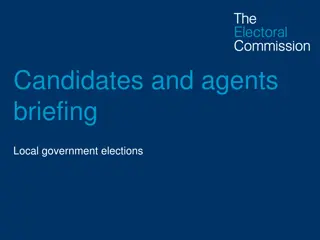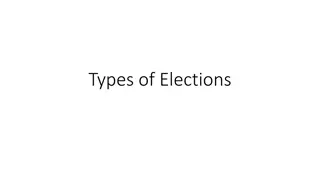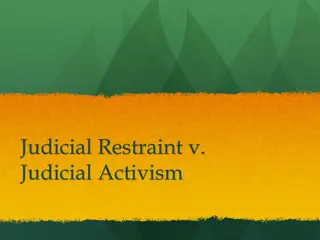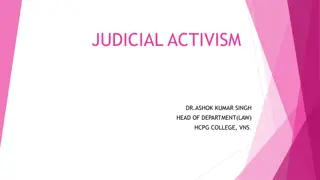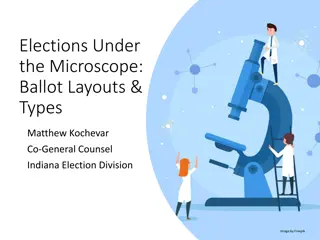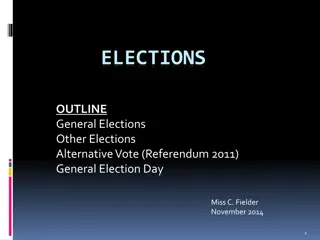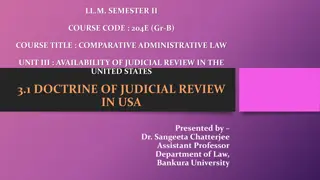Briefing on Judicial Reform and its Impact on the 2023 Elections
On February 23, 2023, a briefing was held by the Presidential Communication Team at the State House, led by Hon. Abubakar Malami SAN, the Attorney General of the Federation and Minister of Justice. The briefing discussed the Constitutional and Electoral Reform Committee's initiatives, the Justice Sector Reform Plan, and the National Justice Policy aimed at enhancing transparency and fairness in Nigeria's electoral processes. Historical issues impeding free and fair elections were highlighted, including judicial inconsistencies, delays, internal party democracy, illicit funds, and inefficient election result management.
Download Presentation

Please find below an Image/Link to download the presentation.
The content on the website is provided AS IS for your information and personal use only. It may not be sold, licensed, or shared on other websites without obtaining consent from the author.If you encounter any issues during the download, it is possible that the publisher has removed the file from their server.
You are allowed to download the files provided on this website for personal or commercial use, subject to the condition that they are used lawfully. All files are the property of their respective owners.
The content on the website is provided AS IS for your information and personal use only. It may not be sold, licensed, or shared on other websites without obtaining consent from the author.
E N D
Presentation Transcript
1 BRIEFING ON JUDICIAL REFORM AND THE IMPACT ON THE 2023 ELECTIONS BRIEFING ON JUDICIAL REFORM AND THE IMPACT ON THE 2023 ELECTIONS DATE DATE 23RD FEBRUARY 2023 23RD FEBRUARY 2023 TIME: 10:00AM TIME: 10:00AM PRESIDENTIAL COMMUNICATION TEAM STATE HOUSE BRIEFING PRESIDENTIAL COMMUNICATION TEAM STATE HOUSE BRIEFING ABUBAKAR MALAMI SAN, CON ABUBAKAR MALAMI SAN, CON HON. ATTORNEY GENERAL OF THE FEDERATION AND HON. ATTORNEY GENERAL OF THE FEDERATION AND MINISTER OF JUSTICE MINISTER OF JUSTICE
2 BACKGROUND In 2017, the Federal Ministry of Justice with the approval of President Muhammadu Buhari, GCFR set up the CONSTITUIONAL AND ELECTORAL REFORM COMMITTEE (CERC) with a view to addressing the myriad issues affecting or impeding transparenct, free and fair elections in Nigeria In addition, the Federal Ministry of Justice developed a Justice Sector Reform Plan that will address issues affecting the Judiciary in collaboration with the National Judicial Council
3 BACKGROUND Apparently, prevailing interventions are not limited to Electoral Act but extend further to: 1. Constituional and Electoral Reform Committee (CERC) 2. Justice Sector Reform Plan (JSRP) 3. National Justice Policy (NJP) The Federal Ministry of Justice also worked with various stakeholders to develop the National Justice Policy The impact of these policies and how they have improved our judiciary and electoral space are elaborated below:
HISTORICAL ISSUES IMPEDING FREE AND FAIR ELECTION 6 consecutive elections were held from 1999 to date. They were held in 1999, 2003, 2007, 2011, 2015, 2019 and now the 7thone, the 2023 General Elections. 4 Series of ElectoralActs regulated the conduct of the previous elections. Prior to the enactment of the 2022 Act, INEC conducted election with the 2010 Act which had already been amended four times. Despite these amendments and because of the failure of the previous administration to adopt the Uwais Committee Report, INEC and other relevant democratic institutions such as the judiciary struggled to undertake its responsibilities.
5 HISTORICAL ISSUES IMPEDING FREE AND FAIR ELECTION The issues that impeded fair and credible election which the new Act sought to cure are: - Lack of consistency in judicial decisions affecting electoral matters including widespread distortion of the time-honoured judicial practice of stare decisis in view of the overwhelming number of conflicting judgments on election matters- - Delays in the adjudicating electoral matters and in the issuance of certified true copies of judgement - Lack of internal party democracy - the need to prevent the use of illicit funds in the electoral process - Delay in timeline for issuing notices of elections - Delay in announcing results as a result of manual management of election results.
6 IMPACT OF THE ELECTORAL ACT 2022 The Electoral Act was signed into law by His Excellency, President Muhammadu Buhari on 25th February 2022, one year ahead of the 2023 elections. The new Act repealed the 2010 Act to address the shortcoming in Electoral Act 2010 and its amendments. Some of the major changes that have transformed the Nigeria s electoral space include: - The financial financial authonomy a National Electoral Commission Fund (S (S. . 3 3) ) authonomy of the Independent National Electoral Commission (the Commission) by the creation of - Extends the time frame for Notice about election to 360 instead of 90 days as was the case in the previous law (S (S. . 28 28) ). . 360 days days to allow for enough time for planning of election - Provides additional days within which Political Parties could submit the names of their candidates to INEC from 60 to 180 days (S S. .29 29) ). .
7 IMPACT OF THE ELECTORAL ACT 2022 Electoral Offences includes the following: - Forgery/Falsification of Affidavit Sections 23 and 29 (8) - Bribery S. 121 - Undue Influence S. 127 - Threatening (direct or indirect)/Duress Sections 23 and 128 - Political Partices cannot hold or retain funds from outside Nigeria. The Act has placed a limit on contribution by individual to a political party, and limit on the amount individuals can spend on campaign (Sections 85 to 90) - Ensures Inclusiveness for disabled people and different voting booths for men and women (Sections 49 and 54) - Excludes Political Appointees from voting or being voted for during the Convention or Congress of a Party to avoid undue influence (S. 84)
8 IMPACT OF THE ELECTORAL ACT 2022 To ensure transparency in the record of voters, the new Act created a NATIONAL will be located at the INEC headquaters and at the states, Local Government Areas and Federal Capital Territory (electronic and hardcopy) as opposed to the manual and hard copy that was the case before the new Act was enacted. (Section Section 9 9) ) NATIONAL REGISTER REGISTER OF OF VOTERS VOTERS which The use of Technology to advance transparency and ensure voters confidence is one of the innovation in the Act. The Act allowed INEC to develop the BiomodalVoter Accreditation System (BVAS) to accredit voters, verify voters information, and transmit the results of election. (Sections 41, 47, 62, 68 Cured the challenges related to inconsistent judicial pronouncements regarding the substitution or death of a candidate after primary elections under sections sections 33 33 and and 34 34 requiring that a candidate can only be substituted if he withdraws and a primary shall be conducted by a political party within 14 days of the death of a candidate
9 JUSTICE SECTOR REFORM JUSTICE SECTOR REFORM Since 2015, the President assented to the following Bills to ensure that the justice sector is strong and capable of dealling with matters arising from elections but from other criminal and civil adjudication Nigeria Correctional Services Act, 2019 Police Act, 2020 Money Laundering and Prevention Act 2022 Proceeds of Crime (Recovery and Management) Act, 2022 Mutual Legal Assistance Act 2018 Discrimination Against Persons with Disabilities (Prohibition) Act, 2018 to prevent and punish human rights abuses against persons with disabilities. This has also helped INEC to be inclusive in its management of elections in Nigeria.
10 JUSTICE SECTOR REFORM JUSTICE SECTOR REFORM The enactment of the Administration of Criminal Justice Act and its full implementation by the administration of President Buhari brough far-reaching reforms such as: Setting up of the Administration of Criminal Justice Monitoring Committee (ACJMC) at the Federal Level Decongestion of Correctional Centres across the country Robust Oversight functions of the Judiciary over the Police Cells and other Detention facilities other Reporting Obligation have been activated through the organization of Zonal Sensitization Workshops
11 JUSTICE SECTOR REFORM JUSTICE SECTOR REFORM Sensitization workshops were organized to build capacity of stakeholders from six (6) geo-political zones so far, in the country between 2017 2022. The total number of participants trained in six Geo-Political Zones across the = 1083 country on the National Policy on Justice Information Technology Adoption of virtual court proceedings e.g. setting up of 2nos functional Virtual hearing studios in the FMOJ Headquarters Increased adoption of electronic case tracking and case management systems by various justice institutions Creation of electronic database systems in justice institutions Establishment of electronic Justice Resource Centers in five pilot locations - Federal Ministry of Justice (FCT), Yobe, Bayelsa, Benue andAnambra State. Establishment of National Criminal Justice Information System
12 JUSTICE SECTOR REFORM JUSTICE SECTOR REFORM Fiat granted to 36 State Attorneys-General which has facilitated the prosecution of cases by state AGs to address the backlog of cases. Development of a National Policy on Justice in the year 2017. This is the first of its kind in the country. Organising a National Sensitisation workshop for the Heads of Justice Sector Institutions in the six geo-political zones in the year 2017 on theAdministration of Criminal JusticeAct, 2015. Development of a National Policy on Prosecution, Code of Conduct and Guidelines for Prosecutors. Establishment of Justice Sector Reform Committees in about Thirty States of the Federation. Sentencing Guidelines for Judicial officers. This is to assist the Courts to sentence suspects convicted of an offence to appropriate imprisonments and avoid public criticism that had hitherto been associated with judgements of Court considered not to be in public interest or in the interest of justice. Development of Court Users Guide Establishment of Family Courts through the appointment and training of family Court Judges and accessors
13 JUSTICE SECTOR REFORM JUSTICE SECTOR REFORM Convening the maiden edition of a National Summit on Justice in the year 2017. The Summit adopted the draft National Policy on Justice developed by the Technical Committee. It has now been institutionalized as an annual mechanism to monitor its level of implementation and subject the Policy to review once in every five years. Establishment of Justice Research Centre (JRC) at the Federal Ministry of Justice. Law and Development Project. The Law and Development project is an ongoing initiative of the Federal Ministry of Justice geared towards the Federal Government s resolve to diversify the economy, create jobs for the teaming unemployed youths and boost revenue generation for the government.
IMPACT OF JUDICIAL REFORMS IMPACT OF JUDICIAL REFORMS 14 Detailed Background Checks involving Anti-Corruption Agencies in the of Appointment of Judges Issuance of various practice directions by the judiciary to ensure prompt hearing of matters in line with ACJA 2015 Training on Rule of Law for Judges and Law Enforcement Officials Agreeing on front-loading of evidence In the year 2018, His Excellency, Mr President Assented to the Alteration of Section 121 of the Constitution of the Federal Republic of Nigeria, 1999(Fourth Alteration) Bill, No. 4, 2017 Act 2018 (date of Assent, Thursday, 7th June, 2018. This Act grants financial autonomy to State Legislatures and State Judiciaries An Executive Order 10 has also been signed by Mr President directing state Governors to comply to ensure judicial financial autonomy and independence
15 CONCLUSION CONCLUSION The activities of the Federal Ministry of Justice under my leadership has led to signficant reforms leading to the passage of several governance and justice sector laws and drafting of policies and regulations. These reforms will impact on the elections positively, improve the transparency of our elections and ensure free and fair election. These initiatives will lead to voters confidence in the electoral system and improve Nigeria s global rating


